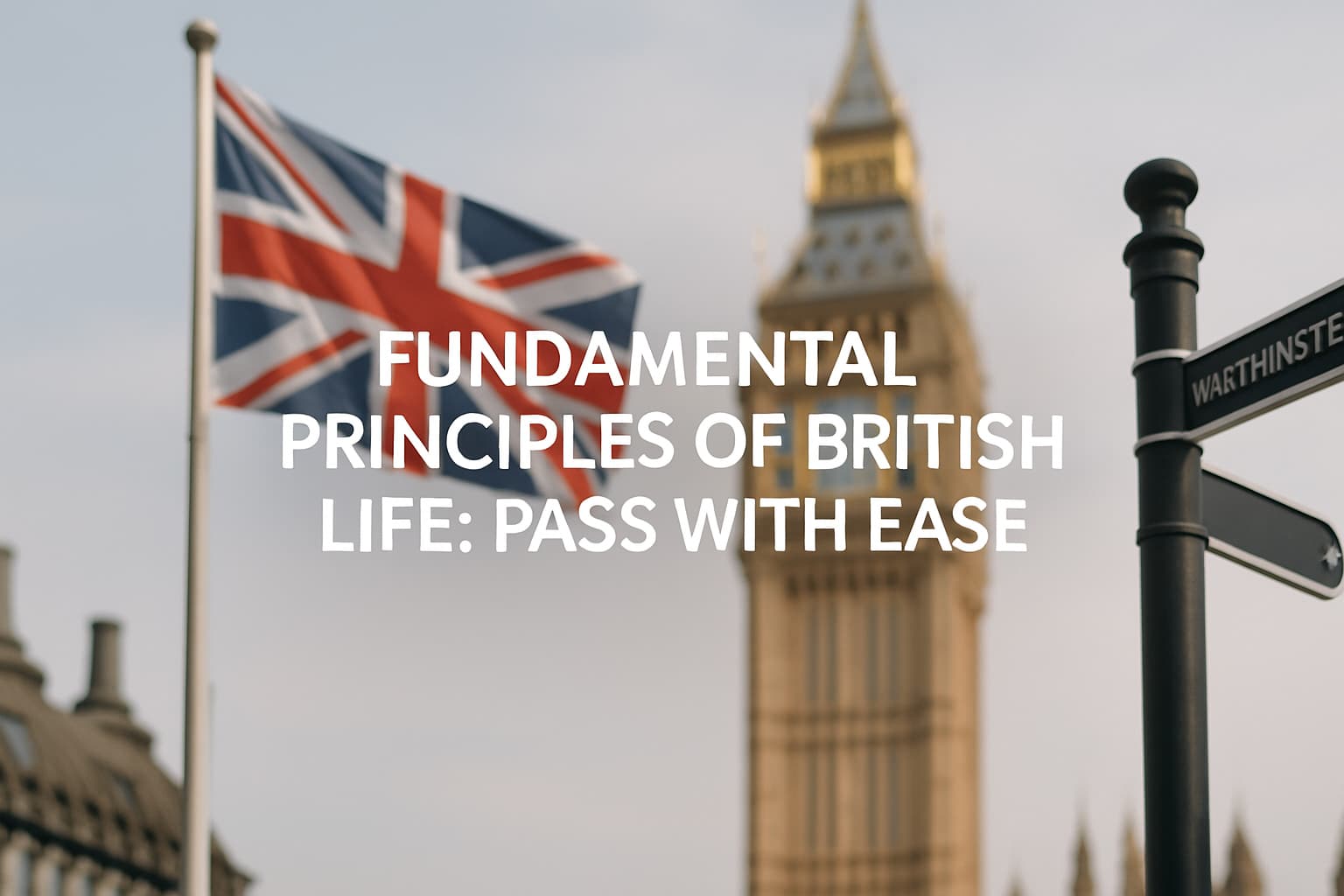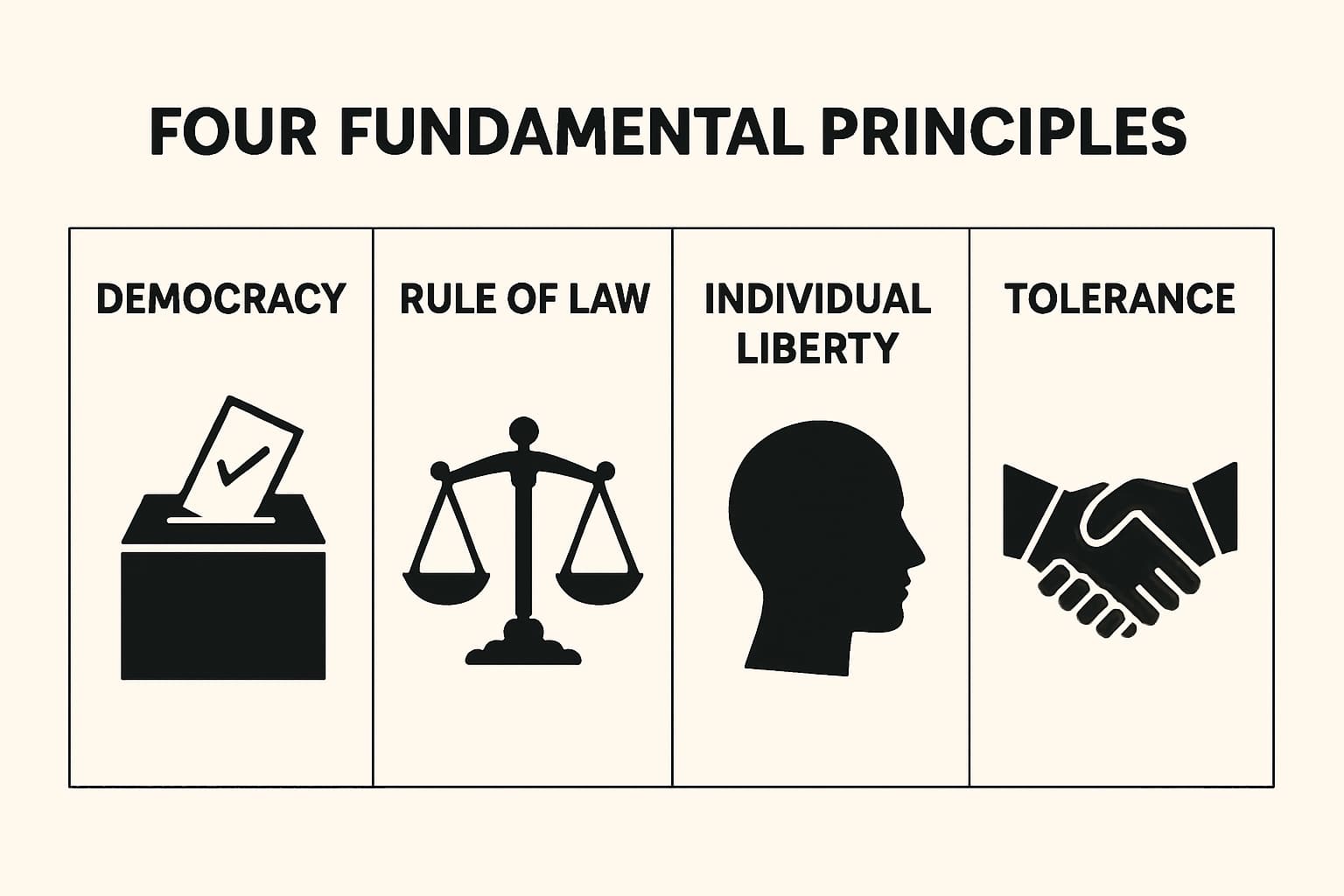Fundamental Principles of British Life: Pass With Ease

Struggling to memorise the values and principles of the UK? Learn exactly what the official handbook says—clearly, concisely, and without off‑syllabus noise—so you can pass with confidence.
In this guide, you’ll get plain‑English definitions, everyday examples, high‑yield revision bullets, a 7‑day study plan, and quick self‑check prompts—aligned only to A Guide for New Residents (3rd edition).
Start smart: what the official guide says and why it matters
The Life in the UK handbook opens with “The values and principles of the UK.” This isn’t filler—it’s tested. Knowing the fundamental principles of British life helps you answer several quick‑win questions and builds context for later chapters.
We stick strictly to the official wording and scope from A Guide for New Residents (3rd edition). No party politics, no legal commentary—just what you need for the exam.
Where this topic sits in the test syllabus
“The values and principles of the UK” appears at the very start of the handbook. The test draws questions from the whole book, so you can expect values‑level checks here: identify a principle, recognise fair/lawful behaviour, or distinguish principles from responsibilities.
For a full content map, see our syllabus overview: Life in the UK Test Topics: The Definitive Syllabus.
The exact list of principles in the guide
The handbook lists four fundamental principles of British life. Learn them exactly as written:
Democracy
The rule of law
Individual liberty
Tolerance of those with different faiths and beliefs

Principles vs. rights and responsibilities
Principles are the core values above. The handbook also highlights supporting rights and civic responsibilities (for example: obey the law, respect others, contribute to your community). Don’t mix these up in the test—the principles are fewer and fixed; responsibilities describe how people should behave within those principles.
Democracy in the UK context
Democracy underpins how people influence public life in the UK. It’s about choosing representatives and having a say in how the country is run.
Plain meaning from the guide
Definition — Democracy: People have a voice in how decisions are made, chiefly by electing representatives to make decisions on their behalf.
Everyday examples you’ll recognise
Voting in elections when you are eligible.
Contacting representatives (such as your MP or local councillor) to express views.
Taking part in community life respectfully within the law.
What the test may expect about democracy
Identify democracy as a fundamental principle.
Recognise lawful, peaceful ways people participate (e.g., voting, contacting representatives).
Keep it values‑level—no party politics required.
The rule of law: meaning and examples
The rule of law is essential to a safe, fair society. Laws apply equally and create order and trust.
What “rule of law” means in the guide
Definition — Rule of law: Everyone must obey the law and no one is above it. Laws protect people and maintain order.
How it appears in daily life and institutions
Obey the law in everyday actions (e.g., driving, paying for goods, following local rules).
Fair processes in public services and courts.
Trusted institutions that act within the law and are accountable.
What the test may expect about rule of law
Spot the rule of law as a fundamental principle.
Recognise “equal application of the law” and “no one is above the law.”
Individual liberty: rights, duties and respect
Individual liberty means you can make personal choices and express views—within the law and with respect for others.
What “individual liberty” means in the guide
Definition — Individual liberty: The freedom to make choices in your life and to express your opinions, as long as you act within the law.
Liberty and limits: living alongside others
Respect others’ rights while exercising your own freedoms.
Follow lawful limits (e.g., speech and conduct must stay within the law).
Behave responsibly in public and online; freedom and responsibility go together.
What the test may expect about liberty
Identify liberty as a fundamental principle.
Choose examples that show lawful, respectful freedoms (not harmful or unlawful acts).
Tolerance of those with different faiths and beliefs
People in the UK are expected to live peacefully with others of different religions and beliefs, including those with none. The emphasis is mutual respect and lawful coexistence.
Definition from the guide
Definition — Tolerance: Respecting the right of people to hold different faiths and beliefs (or none) and to live their lives peacefully within the law.
Examples from everyday UK life
Religious freedom: attending a place of worship or choosing not to, without harassment.
Respecting others’ choices about clothing, diet or customs when they are within the law.
Peaceful coexistence at school, work and in communities.
What the test may expect about tolerance
Identify tolerance as a fundamental principle.
Recognise respectful behaviours aligned to lawful diversity.
Linking it together: the values and principles of the UK
The four principles work together to shape civic life: people choose representatives (democracy), everyone follows the same laws (rule of law), individuals make lawful choices (liberty), and different beliefs coexist peacefully (tolerance).
How the four principles reinforce each other
Democracy + rule of law: elections are run by rules all must follow.
Liberty + tolerance: you express views and respect others’ rights to do the same.
All four: together, they enable fair participation in community life.
Rights and responsibilities that support them
The handbook highlights everyday responsibilities that sit alongside your rights and freedoms, such as:
Respect and obey the law.
Respect the rights of others and treat people with fairness.
Look after yourself and your family.
Look after your local area and the environment.
Contribute to your community within the law.
Principles vs. other UK values (quick comparison)
Fundamental principles: the four items above—fixed list in the handbook.
Responsibilities and expectations: behaviours that support living by those principles.
Broader cultural themes: history, institutions, traditions—covered elsewhere in the handbook and syllabus.
High-yield facts to memorise for the Life in the UK Test
Use this as an exam‑morning recap. Keep it purely on-syllabus.
The four principles at a glance
Democracy
The rule of law
Individual liberty
Tolerance of those with different faiths and beliefs
Responsibilities and respectful behaviours to know
Obey and respect the law.
Respect the rights of others and treat people fairly.
Look after yourself and your family.
Help your community; look after your area and the environment.
Common traps and clarifications
Principles ≠ policies: principles are timeless values; policies and parties are not tested here.
Tolerance ≠ agreement: you can disagree and still respect others’ lawful choices.
Liberty within the law: freedom does not cover unlawful or harmful acts.
7-day study plan using the Life in the UK Test App
Short on time? The Life in the UK Test App streamlines revision with structured handbook content, 650+ questions with explanations, a readiness score, Hard Mode mock tests, offline study, and a smart assistant (“Brit‑Bear”) to target gaps—all designed to reduce overwhelm and retest risk.
Days 1–2: Read and highlight the official text
Open the handbook content in the app and read the “Values and Principles of the UK” section end‑to‑end.
Highlight the four principles and the responsibilities list.
Write a one‑line definition for each principle in your notes.
Days 3–4: Drill questions and explanations in-app
Do focused sets on democracy, rule of law, liberty and tolerance.
Read the detailed explanations—learn the keywords the exam uses.
Use spaced practice: revisit missed items the next day.
Day 5: Full mock test with Hard Mode
Simulate the exam pressure with Hard Mode.
Tag any question you hesitate on for review.
Check your readiness score and note weak areas.
Day 6: Fix weak spots with Brit-Bear
Use Brit‑Bear to auto‑build drills on your weakest topics (e.g., rule of law cues vs liberty limits).
Re‑test until your readiness score improves steadily.
Day 7: Final readiness check and test routine
Review the four principles and responsibilities list out loud.
Do one short, calm practice set; avoid cramming.
Set a simple test‑day routine: ID ready, arrive early, read questions carefully.
Want a broader strategy beyond values? Read our prep blueprint: Prepare for Life in the UK Test: Expert Method for First‑Time Pass.
Quick self-check: 10 practice prompts
These are non‑official prompts aligned to the handbook emphasis. Say your answer aloud, then check the principle in your notes.
5 identification prompts
“No one is above the law.” Which principle is this?
“Choosing representatives to make decisions.” Name the principle.
“Freedom to express views within the law.” Which principle fits?
“Living peacefully with people who have different beliefs.” Identify it.
“Equal application of laws to everyone.” What principle is this?
5 example-based prompts
Contacting your MP about local services—which principle?
Respecting a colleague’s religious holiday—what principle?
Following local recycling rules—what principle supports this?
Starting a blog to share your opinions lawfully—name the principle.
Accepting a fair court decision even if you disagree—identify the principle.
Download the Life in the UK Test App
Cut through overwhelm and build exam‑ready recall of the four principles with structured content, targeted practice, and a clear readiness score.
Why it helps for values and principles
Mobile handbook: the relevant section in your pocket for quick refreshers.
Targeted practice: drills on democracy, rule of law, liberty and tolerance with explanations.
Readiness score: know when you’re genuinely ready.
Offline access: revise anywhere, anytime.
Hard Mode mocks: stress‑test your recall before test day.
Get it now
Download on App Store: https://apps.apple.com/app/id6743702124
Get it on Google Play: https://play.google.com/store/apps/details?id=net.briceventures.life_in_the_uk_test
Comparing tools? See our deep dive: Best Life in the UK Test App 2025: Ultimate Guide Review.
Sources and scope
This guide is based on the official handbook, Life in the United Kingdom: A Guide for New Residents (3rd edition). We intentionally exclude party politics, non‑handbook opinions and legal commentary beyond the guide’s scope.
Official source used
Life in the United Kingdom: A Guide for New Residents (3rd edition), “The values and principles of the UK.”
What we did not include
Party politics or policy debates.
Legal analysis beyond the handbook’s explanations.
Off‑syllabus facts not grounded in the official text.
For broader context on test logistics, see independent summaries: a short overview of how the test works and values‑focused background on integration and UK values. To situate values within civic structures, you can also review the UK’s citizenship studies subject content from the Department for Education (PDF). For more prep advice, read: 7 Common Life in the UK Test Mistakes to Avoid and British History, Simplified: High‑Yield Topics to Pass.
FAQ
What are the four fundamental principles of British life?
Democracy; the rule of law; individual liberty; tolerance of those with different faiths and beliefs.Are responsibilities like obeying the law part of the principles?
No. They support the principles but are listed as responsibilities/expectations in the handbook.Does tolerance mean I must agree with others’ beliefs?
No. It means respecting others’ lawful right to hold and practise their beliefs—or none.What does “within the law” mean for liberty and tolerance?
Freedoms are exercised lawfully and with respect for others’ rights; unlawful or harmful acts are not covered.How should I revise this topic quickly?
Memorise the four principles verbatim, learn one‑line definitions, then drill short question sets until you’re error‑free.